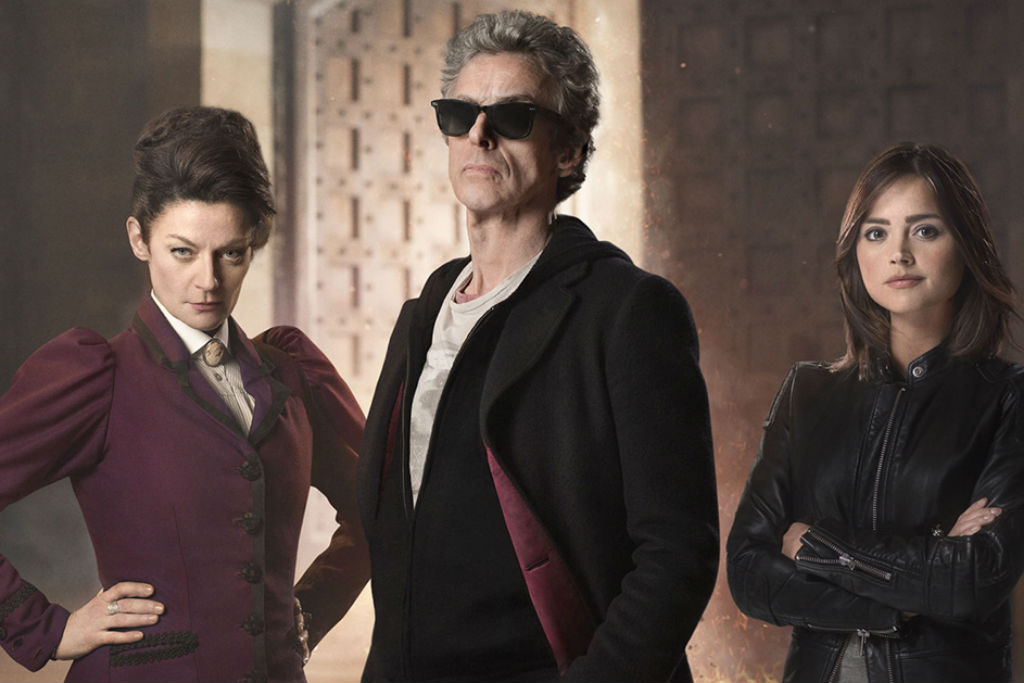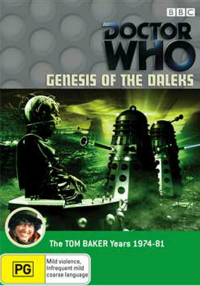‘Doctor Who’ Recap: How Deep Will It Go?
The first episode of Season Nine got meta as hell.

“Davros. My name is Davros.”
Doctor Who is back, and it’s here to completely subvert your expectations. This is not an easy thing for this particular show to do, because anyone who’s been paying attention knows to expect pretty much everything. Including the total opposite of the thing you just expected.
When Doctor Who returned in 2005, showrunner Russell T Davies smartly avoided drawing too close a connection to the original 1963-1989 series. Old school fans desperate for a bridge to the classic series lapped the few crumbs thrown their way, from a dusty Cyberman head in the background to a coded reference to Dalek creator Davros (“A genius… a man who was king of his own little world”). These crumbs slowly grew into feasts as the show grew ever more comfortable acknowledging its history.
Ten years on, the Doctor is saving Kid Davros on a battlefield. How times have changed.
After that massive revelatory opening, the show takes on a magical mystery tour of its recent and not-so-recent history, returning us to the Maldovarium (2011), the Shadow Proclamation (2008), the Sisterhood of Karn (1976), and eventually the Dalek City (196-goddamn-3). This is kitchen sink Doctor Who at its best. To be a memorable season opener, it needs to do something epic, and showrunner/writer Steven Moffat gives us everything we want.
The cascading revelations finally take us to the biggest one for this story: the Daleks, the most destructive force in the universe, owe their creation to the Doctor.
Even one of the show’s most famous moments from 1975’s Genesis of the Daleks – “Do I have the right?” the Doctor asks as he holds two wires up that would end the Daleks before they begun, a clip that Davros actually plays for the Doctor in this episode – doesn’t quite lay the blame at his feet. It’s one thing to ponder the morality of a genocide, it’s another to deliberately save the life of Young Hitler.
The Doctor’s guilt at this discovery is palpable, and he once again puts off dealing with it by throwing a party, this time one that introduces medieval England to the electric guitar.
Meanwhile, Clara is now in full ‘spin–off series or GTFO’ mode as she rides a motorbike into the Tower of London and shows that she’s more than capable of taking control without the Doctor. Year Three of a companion’s journey is usually when they prove to be either (a) utterly amazing and independent at fending off alien invasions, or (b) Tegan. Either way, it’s a signal that it’s time to go, so it’s little wonder the BBC this week announced her imminent departure. Although that’s probably more to do with upping the tension every time Clara is in danger.
Michelle Gomez’s arch Missy continues to steal the show, and the idea that she’s worried about her friend the Doctor is entirely consistent with the show’s history. “He’s not your friend, you keep trying to kill him,” says Clara. “He keeps trying to kill me,” replies Missy. “It’s sort of our texting.”
Eminently quotable, yes, but also rooted in character. Gomez may be prone to more outrageous and counter-intuitive line delivery than the dignified original Master Roger Delgado – her delivery is so delightful, I think I rewound every one of her lines three times each – but the relationship between her and the Doctor is identical.
More than just a fannish checklist, this episode went deep, wielding continuity as a narrative sword. There were numerous original elements to keep it fresh – creepy-as-hell “hand mines,” a brilliant henchman made of snakes, planes suspended in mid-air, an invisible planet – but will such heavy reliance on the show’s past alienate the general audience? In an era where everything past is on disc or online, where wiki guides tell you everything you need to know before, during and after an airing, and where holier-than-thou jerks write patronising episode recaps, maybe there’s no such thing as too deep.
When, in the closing moments of the episode, the very same city depicted in 1963’s The Daleks appeared, I wondered how far they would, or could, take this. Would we see figures of the First Doctor, Susan, Ian and Barbara climbing over the horizon in search of a fluid link? A few short years ago such a thought could not ever be entertained, but now anything and everything seems possible.
–
Questions to Ponder
– Doctor: “What planet is this?” Davros: “I don’t understand.” One thing often forgotten is that key to the origin of the Daleks is their total ignorance of other planets beyond their own until the Doctor told them. That’s important here: the Doctor’s current attack of the guilts is something that’s been building for some time.
– Three versions of Atlantis? Oh, very good. Yes, the origin of Atlantis was explained no fewer than three times in the original show, and many fans and authors have worked hard to reconcile these incompatible depictions. It takes an exceptionally meta form of retcon to deliberately undo all that reconciliation.
– Rocking out to an electric guitar, getting medieval crowds to chant “dude,” and travelling in a phone box. Is the Doctor deliberately doing Bill and Ted?
– “Jane Austen. Amazing writer, brilliant comic observer, and strictly amongst ourselves, a phenomenal kisser.” Given Clara clearly hadn’t met Austen in last year’s The Caretaker, this snogging is a recent development. Let your Austen dream–casting begin, you filthy perverts.
– Try to resist the urge to pause on UNIT’s map that shows all of the Doctor’s various conflicts across the world. Oh, there’s The Masque of Mandragora. And The Angels Take Manhattan. And— stop it, you have things to do.
– “I spent all of yesterday in a bow tie. The day before in a long scarf. It’s my party, and all of me is invited.” He probably just means outfits, but…
– What exactly is Davros’ plan? Does he just want the Doctor to admit that compassion is destructive? Or does he genuinely want the Doctor to kill him as a child? Without the TARDIS, the only way those final moments could happen is if Davros sent him back. What’s the long game here?
–
Throwback Thalday

Want to see that clip of the Doctor contemplating the future of the Daleks in context? Want to know why Davros is so intent on the Doctor finishing what he started? Then you need 1975’s Genesis of the Daleks.
Now narratively linked to The Magician’s Apprentice, this story is considered an all-time classic amongst fans. One of Tom Baker’s first stories, it finally took us back to the actual creation of the Daleks, with a reluctant Doctor sent by the Time Lords to stop Davros creating them at all, thus changing history forever. It’s a corker, and it looks as if it’s one to catch up on ahead of next week’s conclusion.
–
Doctor Who screens at 7:30PM Sundays on the ABC, before reruns at 8:30PM Mondays and 12:15AM Tuesdays.
–
Lee Zachariah is a writer and journalist. He co-hosted the ABC2 film comedy series The Bazura Project, and is a co-presenter of film podcast Hell Is For Hyphenates. He tweets at @leezachariah


